Where to Find the Best Custom API Development Company in the USA
 Marketing IBTI#Marketing IBTI
Marketing IBTI#Marketing IBTI
In the ever-evolving digital world, choosing a reliable custom API development company in the USA is crucial as businesses embrace digital solutions. This blog simplifies the process, providing insights for both tech professionals and business owners looking to leverage APIs.
We'll cover the basics of custom API development, why professional custom API development services matter, and key considerations for choosing the right company. Discover how to find these services in the USA and gain insights into challenges and trends in API development.
So, let’s get started!
What is custom API development?
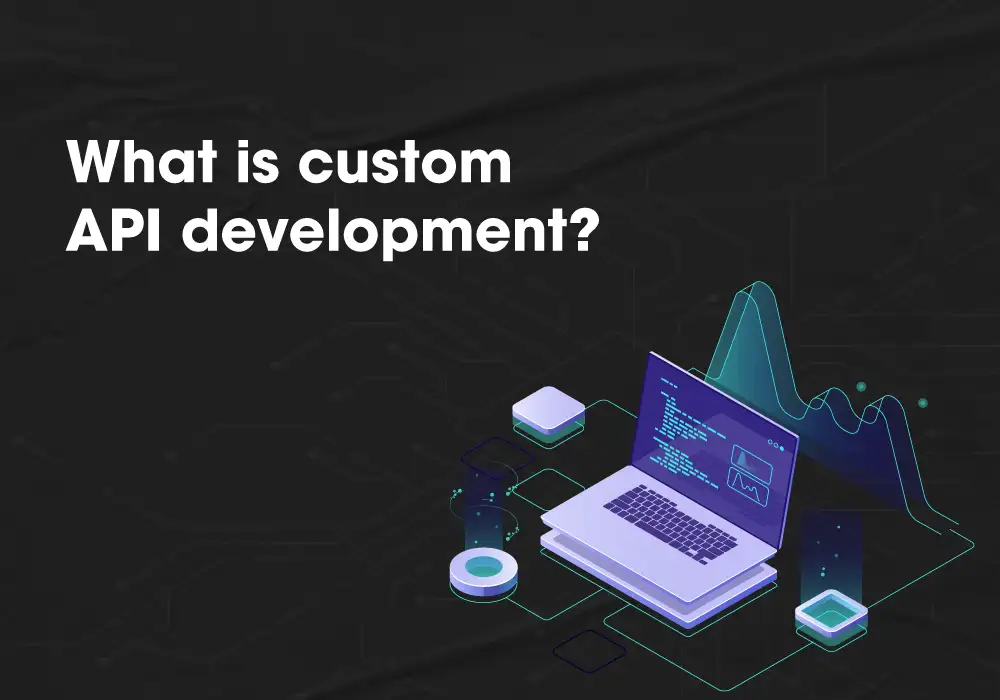
API stands for Application Programming Interface, a communication bridge between different software. Simply, it's like a translator for computer programs, helping them talk to each other and share information smoothly.
It's about creating a unique way for your software applications to understand each other, making tasks smoother and more efficient. Instead of settling for generic solutions, custom API development ensures your systems speak the same language, helping you streamline operations and achieve your business goals seamlessly.
How to create a custom API?
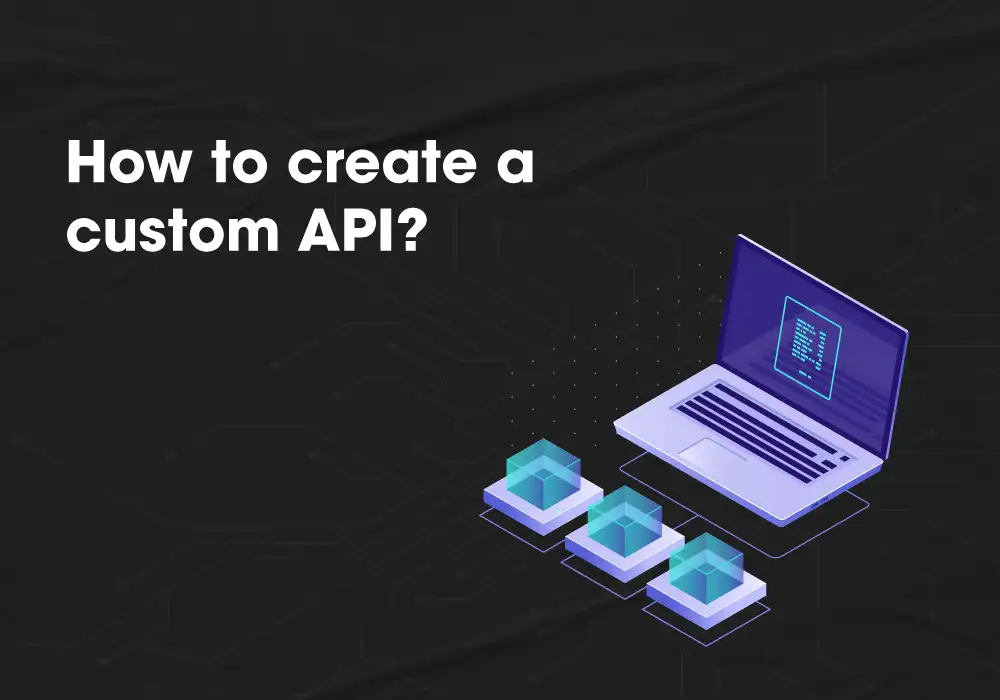
Creating a custom API may sound complex, but let's break it down into simple steps–
Define Objectives and Requirements
Start by clearly defining what you want the API to achieve. Identify the specific functionalities and data it needs to handle. This step sets the foundation for a tailored solution.
Choose the Right Type of API
Determine whether a RESTful API, GraphQL, or another type suits your requirements. Each has its strengths, and selecting the right one ensures optimal performance and functionality.
Design the API
This step involves outlining the structure of your API. Define endpoints, data formats, and the methods the API will support. A well-designed API is crucial for seamless integration with existing systems.
Develop the API
Leverage programming languages such as Python, JavaScript, or Ruby to bring your API to life. Skilled API developers will write the code, ensuring it follows best practices and is scalable for future needs.
Testing
Rigorous testing is essential to identify and fix any bugs or issues. Thorough testing ensures that your custom API performs as intended, providing a reliable and secure platform for data exchange.
Documentation
Create comprehensive documentation for your API. This guides developers looking to integrate it into their systems and ensures a smooth onboarding process.
Security Measures
Implement robust security protocols to protect your data and systems. This includes authentication mechanisms, encryption, and access controls to safeguard against unauthorized access.
Deployment
Once thoroughly tested and documented, deploy your custom API. Choose a hosting solution that aligns with your business requirements and ensures optimal performance.
Monitoring and Maintenance
Continuous monitoring is crucial to identify and address any issues promptly. Regular maintenance ensures your custom API remains up-to-date and compatible with evolving technologies.
Creating a custom API requires a strategic approach, technical expertise, and attention to detail. Collaborating with experienced developers or a custom API development company ensures a smooth process from conception to deployment, ultimately delivering a solution tailored to propel your business forward.
What is the difference between API and custom API?
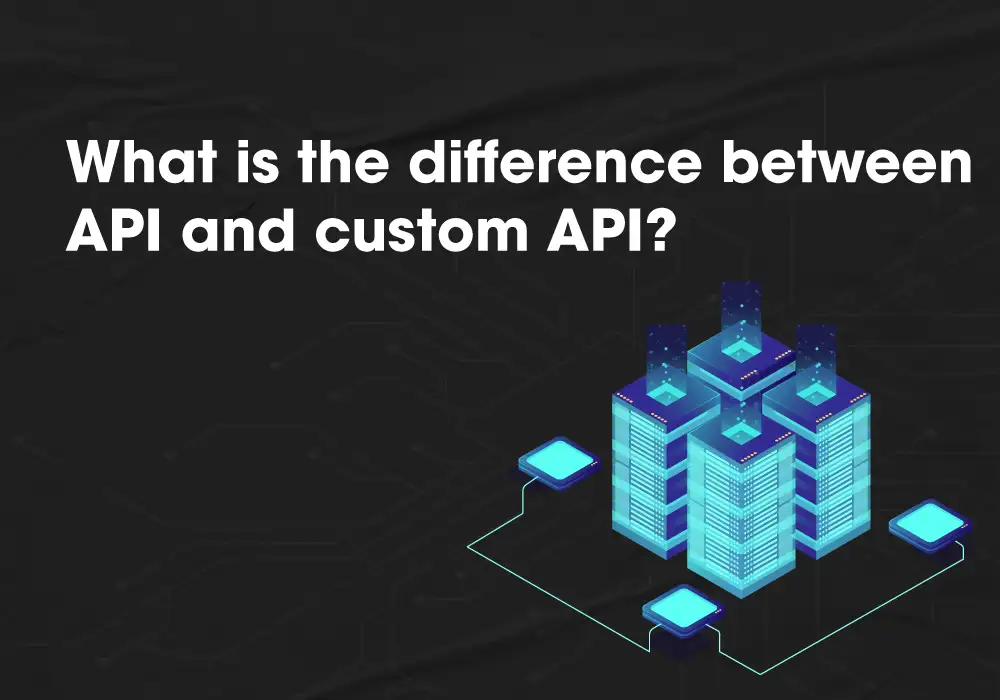
Understanding the distinction between a standard API (Application Programming Interface) and a custom API is crucial for businesses aiming to optimize their digital operations. Let's break down the key differences–
Scope of Applicability
API
In its generic form, an API is a set of rules and protocols that enables different software applications to communicate with each other. It is a universal connector, allowing systems to share data and functionalities.
Custom API
A custom API, on the other hand, is specifically tailored to the unique needs of a particular business. It goes beyond the one-size-fits-all approach, providing a bespoke solution crafted to address an organization's specific requirements.
Flexibility and Customization
API
Standard APIs often come with predefined functionalities and data structures. While they offer broad compatibility, customization options are limited, and businesses may need to adapt their processes to fit the API's capabilities.
Custom API
Custom APIs are highly flexible and can be molded to fit the exact specifications of an organization. This level of customization ensures that the API aligns seamlessly with existing systems and processes, enhancing efficiency.
Purpose and Functionality
API
APIs cater to a wide array of applications and industries. They provide a standardized way for diverse systems to interact, promoting interoperability on a broader scale.
Custom API
A custom API is purpose-built. It is designed with a specific set of functionalities tailored to the unique needs of a business. This precision ensures that the API optimally serves the intended purposes of the organization.
Development Approach
API
Standard APIs are often readily available and can be implemented with minimal development effort. They follow established industry standards and are designed for general use.
Custom API
Developing a custom API involves a more intricate process. It requires a detailed understanding of the business's objectives, specific data requirements, and workflows. This tailored approach demands higher expertise but delivers a solution that precisely fits the organization's needs.
What are the benefits of custom API?
Embracing custom API development comes with a multitude of advantages that can elevate your business operations to new heights. Now let's have a look at the benefits of custom API development–
Tailored to Your Needs
Custom APIs are like a made-to-measure suit for your business. They are designed specifically to fit your unique processes, ensuring that the solution aligns seamlessly with your objectives and workflows.
Enhanced Efficiency
One-size-fits-all solutions may not always cater to the intricacies of your business operations. Custom APIs, however, streamline processes, eliminate redundancies, and boost overall efficiency by addressing your specific requirements.
Flexibility and Scalability
Businesses evolve, and so should your digital solutions. Custom APIs offer the flexibility to adapt and scale alongside your growing needs. This adaptability ensures that your technology infrastructure remains robust and future-ready.
Cost-Effective in the Long Run
While the initial investment in custom API development may seem higher, it pays off in the long run. The tailored solution eliminates the need for unnecessary features, optimizing costs and providing a more efficient return on investment.
Seamless Integration
Off-the-shelf APIs might require adjustments in your existing processes to fit their mold. Custom APIs, however, seamlessly integrate with your current systems, reducing the time and effort required for implementation.
Security Tailored to Your Needs
Security is a top concern in the digital realm. With a custom API, you can implement security measures tailored to your specific requirements, ensuring robust protection against potential threats.
Improved User Experience
A custom API enhances the overall user experience by providing a solution that mirrors the natural flow of your business. This leads to improved user satisfaction, both internally among employees and externally for clients and customers.
Competitive Edge
In a competitive landscape, having a custom API that precisely aligns with your business needs can be a strategic advantage. It allows you to differentiate your services and respond swiftly to changing market demands.
Ownership and Control
With a custom API, you have complete ownership and control over the solution. This means you can make adjustments, updates, and improvements as needed without being dependent on external factors.
Common Challenges in API Development
While custom API development offers plenty of benefits, it's crucial to be aware of common challenges that may arise during the development process.
Understanding these challenges and their solutions ensures a smoother journey toward harnessing the full potential of your custom API–
Security risks
APIs are gateways into applications, making them attractive targets for bad actors. Hackers are always looking for ways to access sensitive data and information. To prevent DDoS attacks and API spikes, developers can place a rate limit on how and how often an API can be called.
Performance
An API that isn't optimized for performance can lead to slow response times, increased latency, and poor user experience. This can result in frustrated users and lost business.
API design
Designing an API that meets the needs of both the business and the end-users can be complex. API design requires a deep understanding of the business requirements, the system architecture, and the needs of the end-users.
Versioning
One of the main challenges of API versioning is measuring the impact of changes on the business and users. This involves collecting and analyzing data to answer questions such as how many users are using each version of the API and how satisfied they are with the functionality and performance.
Scalability
Real-time web applications refresh queries every few seconds, which can require a large number of database queries. This can work for a few users but may not for thousands or millions of users.
Compatibility and integration issues
Integrating off-the-shelf software with existing operating systems can be challenging. Compatibility issues can require additional time and resources to resolve.
Data migration
Data migration can be a major challenge, and there are many potential pitfalls to avoid. Duplicated data is one common issue.
Testing
Implementing an integration solution and testing it can be difficult. This is due to the need to access various systems and verify the success of the integration from the perspective of different user roles.
Error handling and debugging
Proper error handling and debugging can uncover bugs and streamline the development process.
The Future of Custom API Development and Emerging Trends
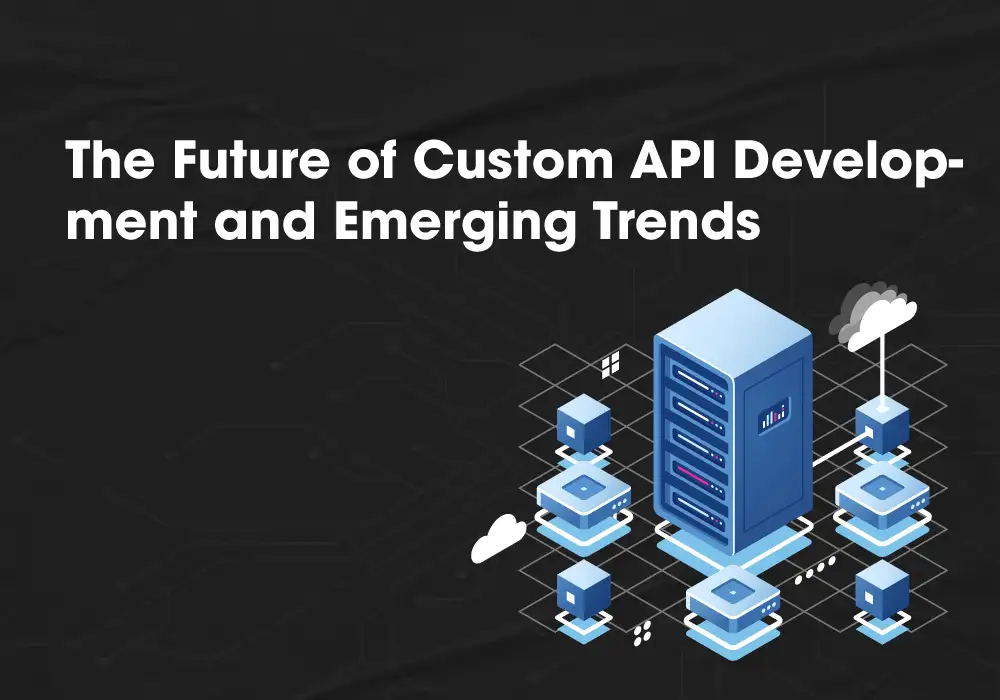
In the world of custom API development, exciting changes are on the horizon. Like trends in fashion, the API scene is always evolving. Let's check out some cool trends shaping the future–
- Serverless computing: Clouds that manage machine resource consumption can replace traditional servers. This can help reduce development and support costs and create more internet-resilient apps.
- API security: API security is a top priority for many organizations. Gartner predicted that by 2022, API abuses would become the most frequent attack vector.
- Machine learning APIs: AI is developing autonomous software that registers itself with an API database. It can find and install a relevant API without human interference.
- Newer API architectures: While REST- and HTTP-based services are still the most popular, newer architectures like GraphQL, gRPC, and event-driven architectures are growing in popularity.
- Connected ecosystem of API tooling: Enterprises have different API-related priorities and use cases that change over time. They need tooling that can deliver these priorities quickly and to a high standard.
- AI chatbots: As AI technology evolves, chatbots will become more intelligent and capable of handling complex tasks. They will also become more personalized, providing tailored experiences for users based on their preferences and behavior.
How to Find the Best Custom API Development Company in the USA
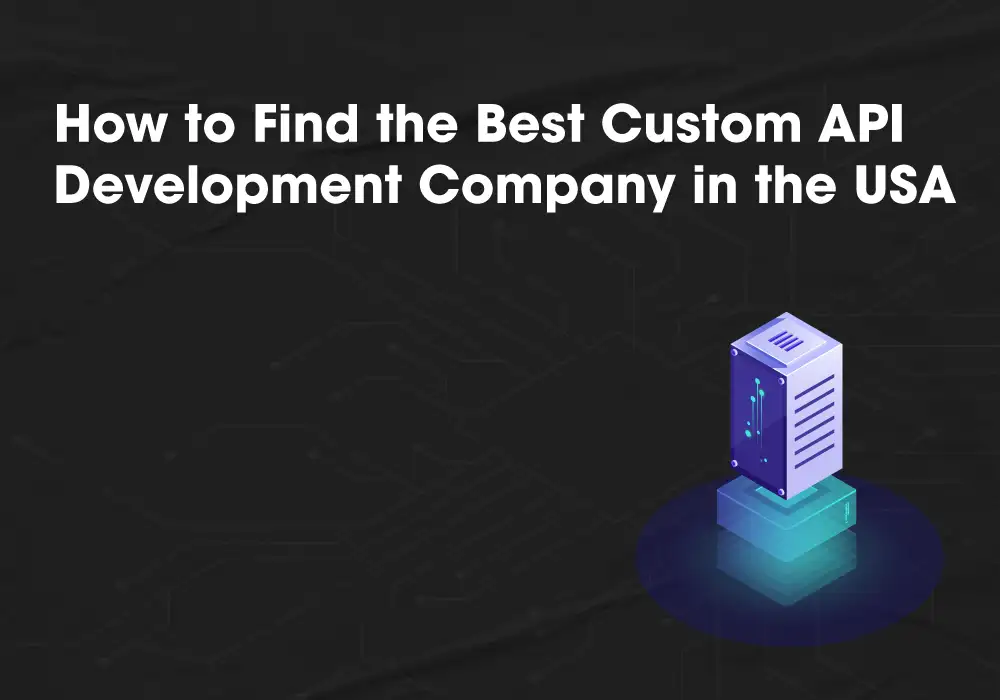
In the buzzing landscape of custom API development services, selecting the right development partner is a crucial step on the path to success. Let's explore the key considerations and steps to identify the best custom API development company in the USA–
Expertise and Experience
Look for a company with a proven track record in custom API development. Experience matters, as it demonstrates their ability to tackle challenges and deliver effective solutions. Assess their portfolio to gauge their expertise in crafting APIs tailored to diverse business needs.
Technical Proficiency
Evaluate the technical proficiency of the development team. Ensure they are well-versed in the latest programming languages, frameworks, and industry best practices. A technically adept team can navigate challenges, ensuring the seamless development of your custom API.
Client Reviews and Testimonials
Seek out client reviews and testimonials to gain insights into the company's performance and client satisfaction. A reputable custom API development company should have a positive track record of delivering on promises and fostering strong client relationships.
Collaborative Approach
Look for a company that values collaboration. Effective communication and a collaborative mindset ensure that the development process aligns with your vision and business objectives. Transparent communication and regular updates are indicative of a company's commitment to client satisfaction.
Scalability and Flexibility
A great custom API development company should design solutions with scalability in mind. Your business will grow, and your APIs should be able to handle increased demands. Ensure that the company's solutions are flexible and adaptable to evolving requirements.
Security Measures
Security is non-negotiable in the digital landscape. Inquire about the security measures implemented by the company to safeguard your custom API and sensitive data. A reliable company will prioritize robust security protocols, ensuring the integrity and confidentiality of your information.
Cost-Effectiveness
While cost is a factor, prioritize value over the lowest price. A quality custom API development company provides a cost-effective solution that aligns with your budget while delivering the desired functionalities and performance.
Post-Development Support
Inquire about post-development support and maintenance. A reliable company provides ongoing support to address any issues, implement updates, and ensure the optimal performance of your custom API.
Wrap up
As you explore the landscape of custom API development and seek a trusted partner, consider the excellence that IBTI, a leading remote software development company, brings to the table. Known for its expertise, collaborative approach, and commitment to client satisfaction, IBTI offers tailored solutions to meet diverse business needs.
With a proven track record, advanced technological proficiency, and a client-centric mindset, IBTI stands as a strong contender in the realm of custom API development.
Feel free to explore the possibilities with IBTI for a seamless and innovative journey into the digital landscape.
FAQ
What makes custom APIs different from standard APIs?
Custom APIs are tailor-made solutions designed for specific business needs, offering flexibility and precision, whereas standard APIs follow a universal approach.
How do AI-powered APIs enhance functionality?
AI-powered APIs learn, adapt, and predict user needs, optimizing data flow, automating security, and providing personalized recommendations.
Why is serverless architecture gaining popularity?
Serverless architecture allows API development without managing server infrastructure, offering cost-effectiveness, scalability, and simplified maintenance.

Marketing IBTI
#Marketing IBTI🇧🇷 Português
A IBTI é uma empresa de tecnologia com mais de 12 anos de experiência em desenvolvimento de sistemas, apps e soluções sob demanda. Atuamos no Brasil e no exterior com foco em qualidade, inovação e eficiência.
🇺🇸 English
IBTI is a tech company with over 12 years of experience developing custom software, apps, and IT-as-a-service solutions. We serve clients in Brazil and abroad, with a strong focus on quality, innovation, and efficiency.